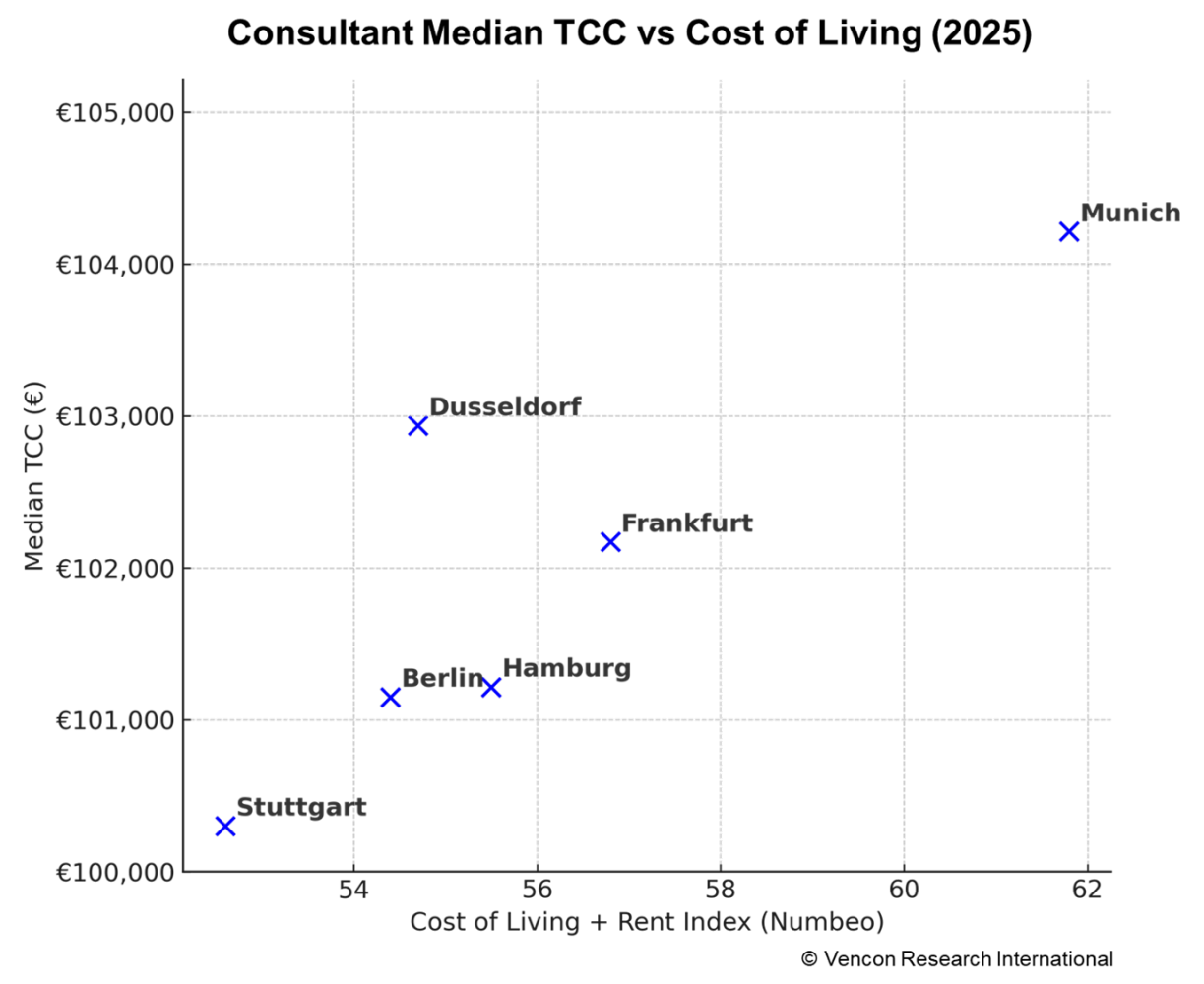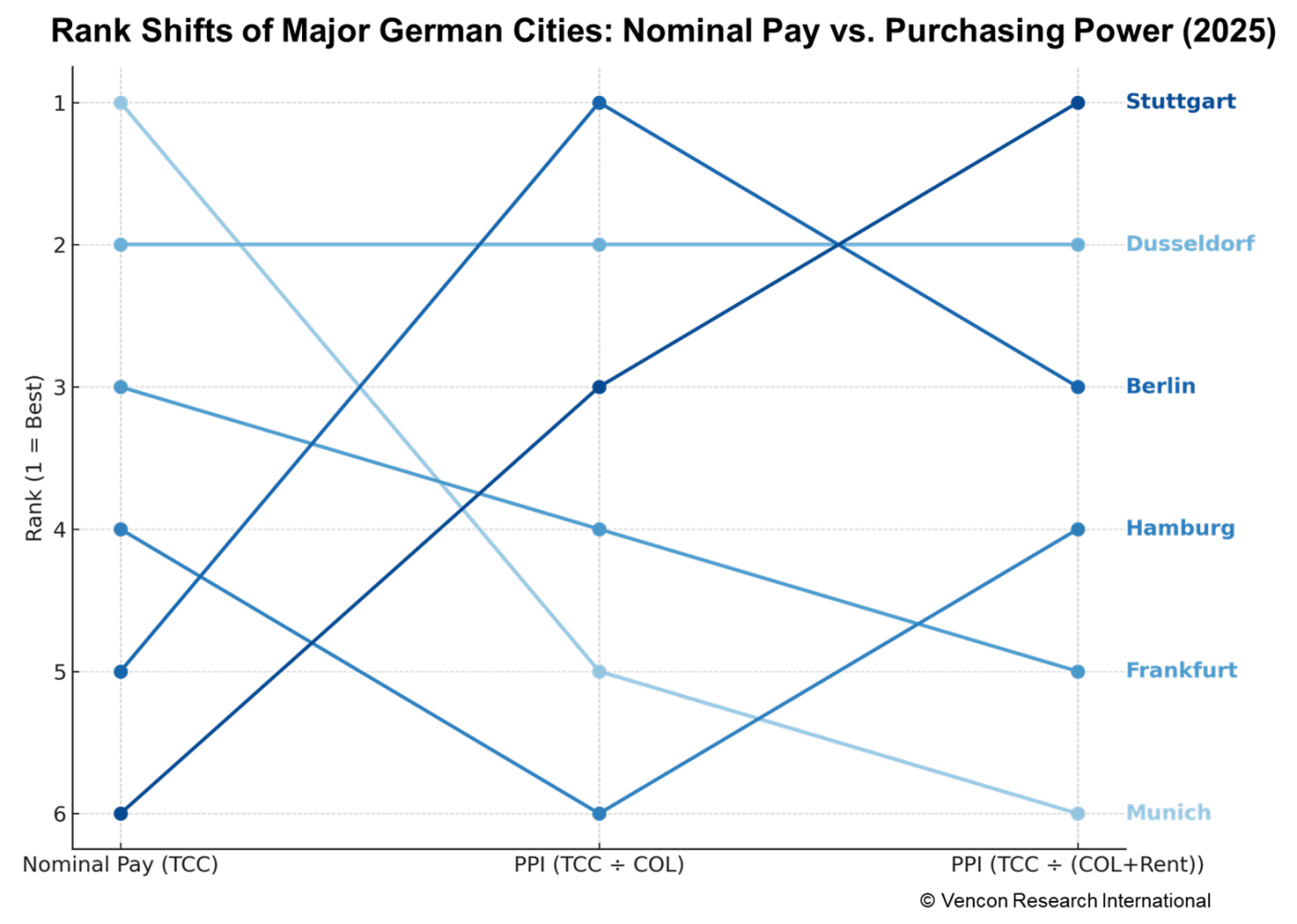By Irina Kvirikadze & Makar Evdokimov
Consultant pay is often used as a benchmark for career and business decisions, but headline figures alone rarely tell the full story. Pay may look similar across Germany at first glance, yet local costs mean the real value of a consultant’s salary can vary widely.
Based on Vencon Research’s compensation data, we benchmarked consultant compensation across six major German cities: Berlin, Düsseldorf, Frankfurt, Hamburg, Munich, and Stuttgart. We used our firm-weighted dataset that captures both base salary and bonus (Total Cash Compensation or TCC). To make comparisons more meaningful, we adjusted salaries against the Cost of Living + Rent Index (Numbeo), which reflects the true purchasing power of a consultant (all levels excluding partners) once local expenses are considered.
The results highlight striking differences in how far consultant pay really goes across Germany.
Key Findings
Munich: high pay, high cost
Consultants in Munich earn the most, with median TCC across all levels excluding Partner at just above €104,000. But with a cost index of 62, the steepest in Germany, much of this headline advantage is consumed by living expenses. Munich remains attractive for its prestige, corporate headquarters, and concentration of top-tier firms, but it is far less compelling when measured by net take-home value.
Düsseldorf: the sweet spot
With median compensation of €103,000 across all levels and a relatively modest cost index (54.5), Düsseldorf offers the most attractive balance between earnings and affordability. It consistently ranks as the strongest city for consultants seeking both competitive earnings and reasonable living costs.
Frankfurt: strong pay, middling value
Frankfurt consultants earn a median TCC of €102,200, but the city’s cost index (56.8) places it squarely in the middle of the pack. As Germany’s financial capital, Frankfurt provides stability and opportunity but doesn’t shine in relative value once affordability is factored in.
Berlin vs. Hamburg: a convergence story
Both Berlin and Hamburg cluster at €101,000 median pay with cost indices between 54–56. This is significant: Berlin was historically far more affordable, but rising rents and living costs have nearly eliminated its affordability edge, bringing it level with Hamburg.
Stuttgart: the hidden value play
Stuttgart ranks lowest in consultant pay (€100,200 median across levels), but also lowest in cost index (52.8). For consultants seeking to maximize savings rather than prestige, Stuttgart offers a compelling case as the most cost-efficient city in this comparison.

Real Purchasing Power Perspective: The Rankings Flip
Looking beyond nominal pay to purchasing power (PPI 2025) adjusted for cost of living and rent, the rankings shift dramatically:
- Munich drops from #1 in nominal pay to last place (#6) once high costs are included.
- Frankfurt follows a similar decline, slipping down the ranks when affordability is considered.
- Düsseldorf remains the most balanced, combining high pay with manageable costs.
- Berlin and Hamburg are now nearly indistinguishable in value.
- Stuttgart emerges as the clear winner, ranking #1 when adjusted for both cost of living and rent.
Why These Differences Exist: It’s More Than Just Numbers
Several dynamics explain why salaries and affordability have evolved the way they have:
- Munich continues to attract global headquarters and top-tier consulting firms, especially in strategy and technology. This prestige drives up both salaries and housing costs, creating a high-pay, high-cost profile.
- Berlin, once seen primarily as a creative and start-up hub, has evolved into a magnet for global consulting firms. The city attracts young, international talent with expertise in digital, analytics, and technology—skills that are increasingly critical as client projects shift toward transformation and digitalization. This demand is pushing salaries up, but it's also making the city more expensive for everyone.
- Frankfurt remains Germany’s financial centre. Driven by the banking and financial services sector, demand for finance, risk, and regulatory expertise fuels robust compensation and a steady, high-pay, high-cost environment, however with less explosive growth than tech-centric hubs.
- Stuttgart reflects its regional profile: fewer top-tier consulting firms and more moderate salaries, but far more manageable living costs.

The Future of Consultant Pay (2025-2030)
Looking ahead, several dynamics are likely to reshape consultant pay and affordability across Germany’s major cities:
- Housing market pressures will intensify. Demand for urban housing in cities like Munich, Berlin, and Frankfurt will remain high, keeping the cost of living elevated.
- Remote and hybrid models may redistribute talent. As consulting firms adopt more flexible working models, consultants may increasingly live in lower-cost regions while remaining attached to high-paying city offices. This could weaken the traditional pay–location link over time, especially in costlier locations like Munich.
- Sector shifts will influence city attractiveness:
- Munich and Frankfurt are likely to maintain premium pay due to strategy and finance concentrations.
- Berlin should keep climbing as digital, data, and transformation work become core revenue drivers for firms.
- Stuttgart’s automotive focus could face headwinds if industrial transformation accelerates, potentially limiting salary growth unless diversification occurs.
- Generational and lifestyle choices will shape preferences. Younger consultants continue to value cultural vibrancy and international exposure (Berlin, Hamburg), while mid-career professionals with families may gravitate toward more balanced, affordable environments (Stuttgart, Düsseldorf).
- Purchasing power gaps may narrow further. As costs rise everywhere, the real purchasing power of salaries will become more similar across cities. By 2030, take-home pay could become less of a differentiator between locations
Implication: For consulting firms, this means compensation strategy will need to be more finely tuned to role, level, and specialization, not just location. For professionals, location choice may increasingly be driven by family status, lifestyle and sector focus, as the pure financial trade-offs between cities gradually flatten.
City-Level Dynamics and the Future of Pay
Understanding city-level dynamics is essential for consulting firms when shaping talent strategies, setting competitive pay, and maintaining internal equity. Over the next five years, rising housing costs, remote work, and shifting sector dynamics are expected to narrow city-to-city differences making lifestyle, specialization, and career goals as important as pay when choosing where to work. Firms will therefore need to refine compensation strategies beyond geography.
To stay competitive in this evolving market, deeper insight into level-specific pay, performance-linked rewards, and benefits will be critical. Our detailed country reports provide the intelligence consulting firms and professionals need to make informed, strategic decisions.

